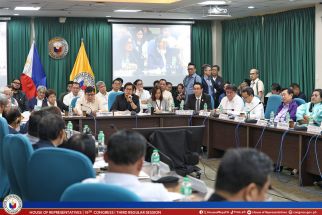South Africa’s Desmond Tutu calls for end to RP killings
March 22, 2007 | 12:00am
Nobel Peace Prize recipient Bishop Desmond Tutu, of South Africa, has added his voice to growing calls for the immediate resolution of the unexplained killings of militants and journalists in the country, the coordinating body in the Philippines of the People’s Tribunal said yesterday.
Dr. Angelica Gonzales, executive director of the International Coordinating Secretariat Permanent Peoples’ Tribunal-Second Session on the Philippines, said Tutu has given his "endorsement" to the fight for justice for victims of unexplained killings in the country.
She said Tutu "wholeheartedly supports the Permanent Peoples’ Tribunal on the Philippines in their noble cause and prays that all of us, through them, will succeed in this pursuit of justice and peace in the Philippines."
Tutu was also quoted saying in his message that "our brothers and sisters in the Philippines, who are fighting for justice and well-being for all, are being slaughtered as we speak. Stop the terror inflicted on those who seek justice in your land. Stop using the so-called war against terrorism to oppress and kill your own people."
Tutu issued his message of support before the international tribunal in The Hague, Netherlands, which began its investigation into unexplained killings in the Philippines yesterday.
Born in 1931 in Transvaal, South Africa, Tutu became the first black general secretary of the South African Council of Churches in 1978. He was awarded the Nobel Peace Prize in 1984 for pushing for "a democratic and just society without racial divisions through equal civil rights for all, the abolition of South Africa’s passport laws, a common system of education and the cessation of forced deportation from South Africa to the so-called ‘homelands.’"
Gonzales said other prominent endorsements came from 2005 Right Livelihood Award recipient and National Chairperson of The Council of Canadians Maude Barlow; 2005 Right Livelihood Award recipient and founder of the Polaris Institute Tony Clarke, PhD; World Alliance for Citizen Participation (CIVICUS) official Cardinal Uwishaka of Mozambique; Professor Yong Bock-Kim of the Presbyterian Church of Korea; Taiwan Labor Party secretary-general Tang Shu; legislator Kao Su-Mei Chin of the Non-Partisan Solidarity Union of Taiwan; Japanese international affairs expert and Peace Research Institute director Professor Kinhide Mushakoji; and Professor Elizabeth Jane Kelsey of the ARENA Network–Aotearoa/New Zealand.
The Asia-Japan Women’s Resource Center, through Secretary General Hisako Motoyama, expressed solidarity with the Filipino people "in their fight against brutal powers." The world’s largest grassroots environmental network, Friends of the Earth International, also sent their endorsement for the tribunal session on the Philippines.
Dr. Angelica Gonzales, executive director of the International Coordinating Secretariat Permanent Peoples’ Tribunal-Second Session on the Philippines, said Tutu has given his "endorsement" to the fight for justice for victims of unexplained killings in the country.
She said Tutu "wholeheartedly supports the Permanent Peoples’ Tribunal on the Philippines in their noble cause and prays that all of us, through them, will succeed in this pursuit of justice and peace in the Philippines."
Tutu was also quoted saying in his message that "our brothers and sisters in the Philippines, who are fighting for justice and well-being for all, are being slaughtered as we speak. Stop the terror inflicted on those who seek justice in your land. Stop using the so-called war against terrorism to oppress and kill your own people."
Tutu issued his message of support before the international tribunal in The Hague, Netherlands, which began its investigation into unexplained killings in the Philippines yesterday.
Born in 1931 in Transvaal, South Africa, Tutu became the first black general secretary of the South African Council of Churches in 1978. He was awarded the Nobel Peace Prize in 1984 for pushing for "a democratic and just society without racial divisions through equal civil rights for all, the abolition of South Africa’s passport laws, a common system of education and the cessation of forced deportation from South Africa to the so-called ‘homelands.’"
Gonzales said other prominent endorsements came from 2005 Right Livelihood Award recipient and National Chairperson of The Council of Canadians Maude Barlow; 2005 Right Livelihood Award recipient and founder of the Polaris Institute Tony Clarke, PhD; World Alliance for Citizen Participation (CIVICUS) official Cardinal Uwishaka of Mozambique; Professor Yong Bock-Kim of the Presbyterian Church of Korea; Taiwan Labor Party secretary-general Tang Shu; legislator Kao Su-Mei Chin of the Non-Partisan Solidarity Union of Taiwan; Japanese international affairs expert and Peace Research Institute director Professor Kinhide Mushakoji; and Professor Elizabeth Jane Kelsey of the ARENA Network–Aotearoa/New Zealand.
The Asia-Japan Women’s Resource Center, through Secretary General Hisako Motoyama, expressed solidarity with the Filipino people "in their fight against brutal powers." The world’s largest grassroots environmental network, Friends of the Earth International, also sent their endorsement for the tribunal session on the Philippines.
BrandSpace Articles
<
>
- Latest
- Trending
Trending
Latest
Trending
Latest
12 hours ago
Headlines
Recommended































